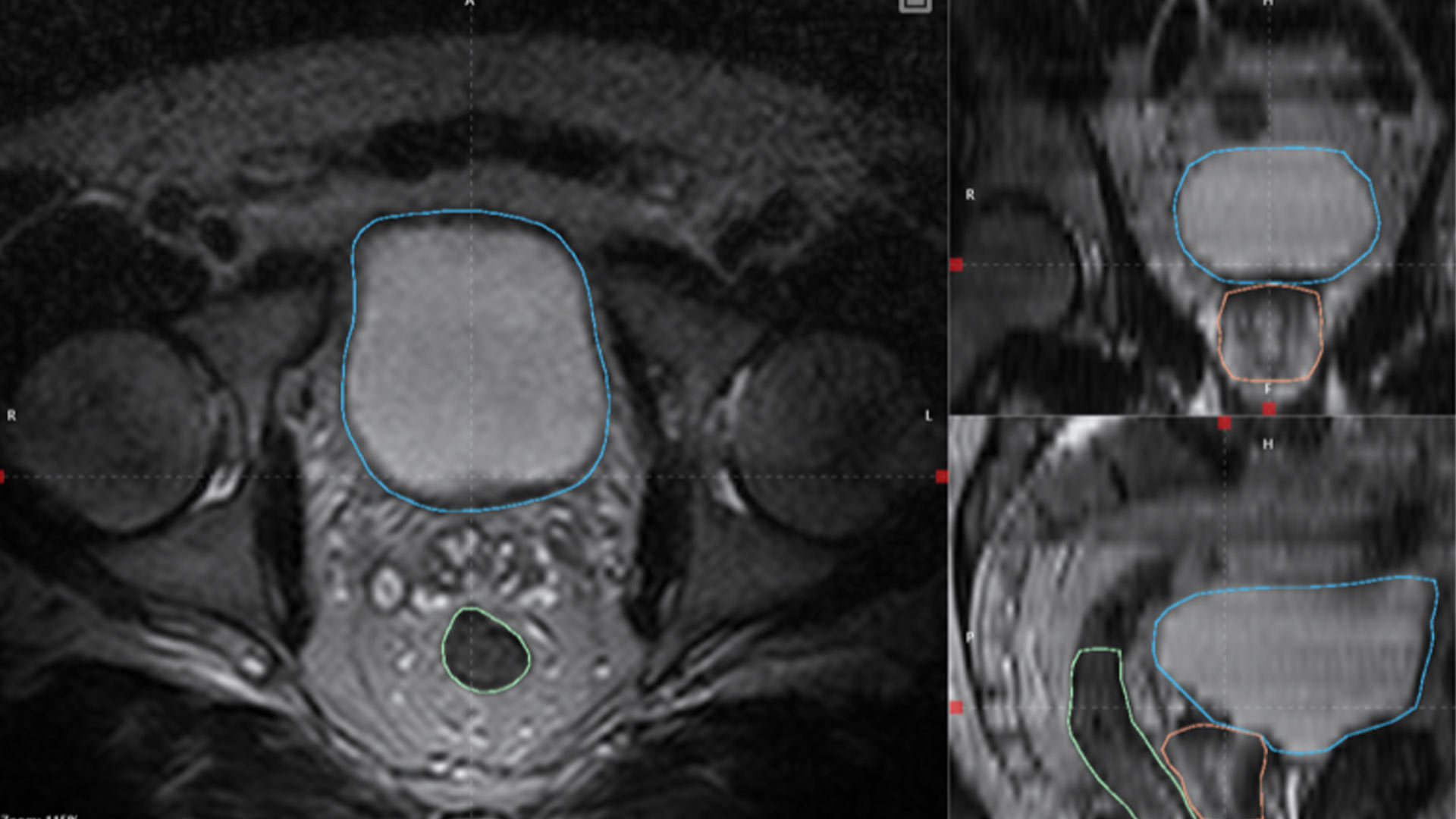Results on testing MVision AI Contour+ for an ingenious and modern approach in radiation therapy have been recently presented at the 62nd Particle Therapy Co-Operative Group (PTCOG) conference in Singapore. Despite being trained using supine MR data and a different magnetic strength from different scanners, authors reported that MVision AI’s Contour+ male pelvis auto-segmentation model performed very well on upright MRI scans.
When we are thinking about the radiotherapy delivery process, we usually have in mind the image of a person lying on their back on a treatment couch, and a gantry rotating around its longitudinal axis. Indeed, most of the time this would be the case. Only rarely the patient is facing down, recumbent on one side or even standing, on adapted devices. However, innovative solutions bring another concept of delivering radiotherapy – in an upright position, sitting similarly as on a chair. This approach is not new, but now it becomes possible because of additional solutions for imaging and treatment delivery (1). It also brings the need of adaptation for immobilization devices, imaging and irradiation sources, and all the other additional solutions.
Almost always, radiotherapy treatments require reproducible anatomy between fractions and limited motion of targets. Gravity seems to help and reduce movements of internal organs (2). It also influences their shape, especially of the ones having a natural cavity that fills with fluid, as the urinary bladder. An interesting study on male pelvis anatomical changes organs’ movement concluded that in the upright position the position and shape of the prostate are not impacted significantly by bladder fill, the anterior-posterior length and the bladder width is significantly large, the seminal vesicles are pushed down and the top of the penile bulb is further away from the apex of the prostate. These differences could translate into smaller treatment fields, so better OAR sparing, and less impact of the bladder filling (3). Another study evaluated intrafraction shifts and patients’ satisfaction during two 20-minute chair rotation sessions, for the same system, which seems to offer excellent stability. Interestingly, patients also rated the upright treatment position at least as good as the supine, the average global comfort being 4.1 for the upright position and 3.9 for the supine position (4). With a fixed beam line and its associated upright positioning device (5), the technology developed by Leo Cancer Care has the potential to reduce hardware delivery constraints and costs related to heavy gantries in proton therapy and costs related to bunker shielding.
A team of 4 UK researchers (Gordon Sands, Jemma Nunn, Tracy Underwood, Niek Schreuder) affiliated to Leo Cancer Care and University College London recently presented their findings in Singapore, at the 62nd The Particle Therapy Co-Operative Group (PTCOG) and 4th Asia-Oceania PTCOG meeting. PTCOG is an international non-profit organization of scientists and professionals interested in proton, light ion and heavy-charged particle radiotherapy, founded in 1985.
In this study, they investigated the performance of male pelvis Contour+ model on five MRI scans of healthy male volunteers who were scanned in both upright and supine position. The automatically generated contours of bladder (including bladder wall), prostate and rectum were judged using a 5-point scale by two radiotherapy-experienced professionals. Score 1 was given for contours in which no changes were needed, 2 for minor changes, 3 for more extensive changes, but still faster than remaking it, 4 for the contours which were probably quicker to recontour, and 5 for unacceptable contours. Not only that there were no contours scored 4 or 5 across all 30 contours, but 80% scored 1 or 2. The prostate scored 1 or 2 in all cases.
These excellent results show the quality of Contour+ male pelvis model, which provided accurate contours in a situation where other algorithms could have got confused by the different position and different image pattern due to the lower magnetic field strength used
We take pride in MVision’s solutions excelling in novel and demanding circumstances, bolstering cutting-edge technologies that democratize and facilitate global access to cancer care.
We are proud to support Leo Cancer Care in their research and development bringing innovations and changing the paradigm of how patients will be treated in radiation oncology. Anticipate more groundbreaking updates ahead!
References
- Rahim S, Korte J, Hardcastle N, Hegarty S, Kron T, Everitt S. Upright Radiation Therapy-A Historical Reflection and Opportunities for Future Applications. Front Oncol. 2020;10:213. Published 2020 Feb 25. doi:10.3389/fonc.2020.00213
- Yang J, Chu D, Dong L, Court LE. Advantages of simulating thoracic cancer patients in an upright position. Pract Radiat Oncol. 2014;4(1):e53-e58. doi:10.1016/j.prro.2013.04.005
- Schreuder AN, Hsi WC, Greenhalgh J, et al. Anatomical changes in the male pelvis between the supine and upright positions-A feasibility study for prostate treatments in the upright position. J Appl Clin Med Phys. 2023;24(11):e14099. doi:10.1002/acm2.14099
- Boisbouvier S, Boucaud A, Tanguy R, Grégoire V. Upright patient positioning for pelvic radiotherapy treatments. Tech Innov Patient Support Radiat Oncol. 2022;24:124-130. Published 2022 Nov 28. doi:10.1016/j.tipsro.2022.11.003
- https://www.leocancercare.com/more-news-and-blogs-0/regulatory-approval-for-leo-cancer-cares-upright-technology-for-radiation-therapy














